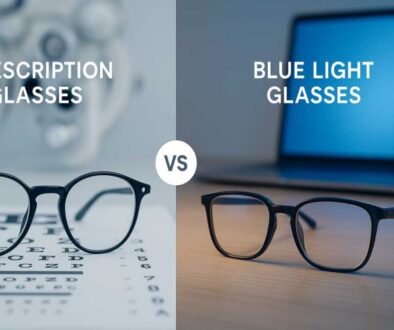5 Winter Eye Care Tips
Cold Weather, Clear Vision: Top 5 Eye Care Tips for Winter
1. Keep Your Distance From Heaters
Resist the urge to sit close to fireplaces, space heaters, or heating vents. While cozy, this exposes your eyes to ultra-dry air. Indoor heating strips moisture from your environment, and proximity intensifies this effect – leading to dry, itchy eyes. Our Fort Collins optometrists recommend:
- Using preservative-free artificial tears for quick relief
- Adding a humidifier to your Northern Colorado home
- Maintaining at least 20 feet from open heat sources
2. Never Skip Winter Sunglasses
Think sunglasses are just for summer? Think again. Colorado’s winter sun delivers equally damaging UV rays – and snow reflects up to 80% more UV light, increasing your risk of photokeratitis (snow blindness). At Poudre Valley EyeCare, we see this condition often in Fort Collins’ high-altitude climate where thinner air offers less UV filtration.
Winter UV dangers include:
-
Snow blindness: UV damage or corneal freezing from wind
-
Symptoms: Pain, light sensitivity, gritty sensation, redness, headaches, temporary vision loss
-
High-risk activities: Skiing, snowboarding, driving, holiday gatherings
Our Fort Collins optometrists recommend:
- Polarized sunglasses with 100% UV protection
- Wrap-around styles for glare and wind reduction
- Goggles for snow sports at local resorts
3. Hydration: Your Secret Weapon Against Dry Winter Eyes
While coffee and tea warm us through Fort Collins’ chilly days, they can’t replace water’s crucial role in eye health. Dehydration reduces tear production, triggering a chain reaction:
-
Surface damage to delicate eye tissues
-
Inflammation and corneal ulcers
-
Increased risk of vision impairment
Poudre Valley EyeCare’s optometrists see this often in dry Northern Colorado winters.
Their hydration prescription:
- Water-first rule: Drink 8 oz water for every hot beverage
- Humidify strategically: Place units near seating areas
- Eye check alerts: Grittiness or redness means hydrate immediately
4. Humidify Your Space for Healthier Winter Eyes
Combat Fort Collins’ dry winter air where indoor heating and cold outdoor conditions team up to dehydrate your eyes. At Poudre Valley EyeCare, we recommend humidifiers as essential tools for Northern Colorado homes and offices.
Why dual-action protection matters:
-
Desktop humidifiers counter dry air from heating systems
-
Moisture barriers prevent tear evaporation during screen work
-
Eye strain reduction when combined with smart screen habits
Our optometrists’ protocol:
- Place humidifiers near workstations (ideal: 40-60% humidity)
- Follow the 20-20-20 rule: Every 20 minutes, look 20 feet away for 20 seconds
- Wear moisture-sealing glasses outdoors for non-desk activities
5. Winterize Your Contact Lens Routine
Fort Collins contact lens wearers face amplified dryness in our high-desert climate. At Poudre Valley EyeCare, we prioritize moisture retention as critical winter eye care – especially for lens users where dehydration can cause corneal abrasions.
Our Northern Colorado optometrists recommend:
- Preservative-free rewetting drops every 2 hours outdoors
- Switch to daily disposables during peak winter months
- “Stop-Drop-Remove” protocol: If eyes sting, apply drops and remove lenses immediately
- After-hours care: Visit our Fort Collins clinic for emergency dryness solutions
Nutrition for Winter Eye Health: Fort Collins Food Solutions
What you eat directly impacts your eyes’ winter resilience. In Northern Colorado’s dry climate, Poudre Valley EyeCare recommends these key nutrients to combat dryness:
Essential Eye-Shielding Nutrients:
-
Omega-3s: Reduce inflammation and boost tear production. Local sources: Colorado-caught trout, Fort Collins farmers’ market walnuts, flaxseed oils.
-
Vitamin A: Protects corneas from winter dryness. Get it from: Sweet potatoes, kale from regional farms, and locally grown carrots.
-
Lutein & Zeaxanthin: Defend against UV/snow glare damage. Find in: Pasture-raised eggs (Northern Colorado), spinach, and kale.
Supplement Smartly with Guidance:
- Consult our Fort Collins optometrists before starting supplements
- Choose omega-3s with 1000+mg EPA/DHA
- Opt for eye-specific multivitamins (look for the AREDS2 formula)
Hydration Synergy:
Double your water intake during Colorado winters! Aim for half your body weight (oz) daily to maintain tear volume.
Winter Eye Drops: Your Fort Collins Survival Guide
Beat Northern Colorado’s dry air with precision eye drop selection. Poudre Valley EyeCare’s optometrists simplify your choices:
Match Your Dryness Level:
-
Mild Discomfort → Preservative-Free Artificial Tears
(e.g., Refresh Optive®)
Use: 4x daily indoors; carry for Fort Collins’ windy outings -
Severe Dryness → Nighttime Lubricating Ointments
(e.g., Systane Nighttime Gel)
Use: Apply before bed to heal while you sleep -
Chronic Conditions → Medicated Prescription Drops
Use: Custom solutions from our Fort Collins clinic
Non-Negotiable Ingredients:
- Lipid-based formulas (repair tear film oil layer – critical in low humidity)
- Hyaluronic acid (holds 1000x its weight in moisture like Colorado snowpack)
- Preservative-free (prevents chemical irritation during frequent winter use)
Special Notes from Our Optometrists:
- Contact lens wearers: Choose drops with “lens-safe” labeling
- Avoid redness relievers (they worsen dryness long-term)
- When to visit us: If drops provide <2 hours of relief
- Pro tip: Store drops away from heaters to preserve efficacy
FAQs
-
Why do my eyes feel so dry in the winter?
Winter air holds less moisture, and indoor heating further dries out your eyes, reducing tear production. Stay hydrated and use a humidifier.
-
What kind of sunglasses should I wear in the winter?
-
How often should I use eye drops for winter dryness?
-
Who is most at risk of contact lens discomfort in winter?
-
What foods help keep my eyes healthy during winter?
-
How can I protect my eyes when skiing or snowboarding?
-
When is the best time to consider laser eye surgery?
-
Is it safe to wear contact lenses in winter?
-
How do humidifiers help with dry eyes in winter?
-
What are the early signs of snow blindness?
-
Can winter allergies affect my eyes?
-
Why do my eyes water more in cold weather?
Dr. Eric Torgerson
Owner at Poudre Valley Eyecare
Dr. Eric Torgerson is the owner of Poudre Valley Eyecare, and has been recognized for his contributions to optometry and his commitment to community health through various roles and accolades within the Northern Colorado Optometric Society and the Colorado Optometric Association.
Why Choose Us?
Our advanced technology and individualized care deliver results for patients of all ages. Our routine exams allow us to spot changes in your vision and allow us to treat those changes early. We have a comprehensive understanding of eye care, which means we can treat a wide range of conditions and chronic diseases. Our in-depth routine exams and customized treatment plans set us apart from the rest.


Please note: None of the above should be considered medical advice. If you’re having any concerns about your vision, please reach out to us immediately or see your primary care provider.




